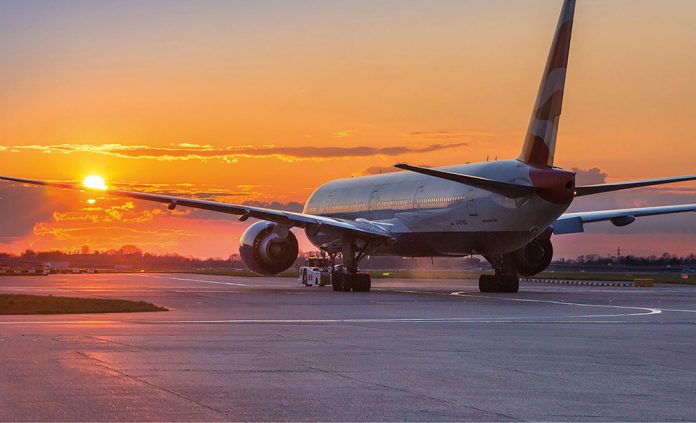The development of a sustainable aviation fuel (SAF) market in the UK promises to significantly reduce carbon emissions in the aviation sector and protect the benefits of flying. Heathrow Airport, alongside the wider aviation industry, is calling on the government to provide a SAF mandate and price support mechanism to kick start a thriving domestic SAF industry, which will deliver jobs and economic growth to all regions and nations of the UK and position the UK as a world leader in this fast-growing sector.
As the UK’s only hub airport, Heathrow is the bridge between Scotland and the rest of world, providing unrivalled connections to and from Aberdeen, Inverness, Edinburgh, Glasgow and Dundee, and bringing over 600,000 passengers to Scotland every year. Heathrow’s route network provides Scotland with the aviation links to over 200 destinations, across 80 countries and serves as a gateway for travellers coming to and from Scotland to access international destinations.
Aviation underpins the global economy and is vital for Scotland international connectivity. However, the benefits of aviation cannot come at any cost; aviation must deliver for both the economy and the environment.
SAF is an alternative to traditional fossil-based aviation fuels, designed to reduce the environmental impact of aviation, delivering 70% lifecycle carbon reduction when compared to kerosene. SAF has the same chemical make-up as traditional kerosene and can therefore be used as a drop-in with existing planes and infrastructure. The technology is proven and already in use in commercial aircraft today, using what would otherwise be waste material.
SAF plays a pivotal role in achieving the UK’s ambitious net-zero emissions goals whilst protecting the huge economic benefits that aviation brings through trade and tourism. The government’s commitment to mandating 10% SAF usage by 2030 is a positive step forward. However, the current trajectory suggests that the UK may become reliant on imported SAF unless further efforts are made to unlock private investments in domestic SAF production. This presents a unique opportunity to establish SAF production plants in the regions and nations of the UK, including Scotland, bringing thousands of well-paid jobs to the Scottish economy, and ensuring long-term fuel security for aviation.
There is a potential in the UK for 14 SAF plants across seven locations, including Scotland. By 2037, UK SAF production could grow over 7 industrial clusters across the country, with Scotland being home to two major sights. St Fergus is a crucial site for low carbon energy and Grangemouth is the home of the UK’s only refinery with a hydrocracker. The SAF industry in Scotland could contribute up to £332 GCA and up to 2,270 jobs. UK wide, these regional clusters could create 10,350 jobs which could increase to 60,000 once the UK leads the way in exporting SAF.
Heathrow’s innovative SAF Incentive Programme marks the next step in the airport’s plan for net zero flying. As a global SAF leader, Heathrow is committed to progressively increasing the SAF used each year, with the airport targeting 11% SAF usage by 2030. This year alone the SAF incentive is expected to save over 81,000 tonnes of CO2 and with a proven track record of success. But the sector could move more quickly and cut carbon faster if government injected necessary pace into the expansion of SAF with supportive policy making. High costs and low production volumes mean it remains in short supply with few able to access it at commercially viable rates.
The appetite to invest into SAF there, but investors want certainty in the longer-term domestic use of before pouring in their capital. Government must act now to support a SAF industry for the UK, by introducing a price support mechanism and by acting on the commitment for at least five commercial-scale SAF plants to be in construction in the UK by 2025.
A price support mechanism – necessary due to the lack of price certainty for SAF – has helped develop a world-leading renewable energy industry in the UK which is now cheaper than the alternatives and has brought huge economic benefits. The US and EU are surging forwards in the race to create new SAF industries, and the UK has all the natural advantages to be able to join them – but we need to move quickly. The appetite to invest is there, but a price support mechanism would de-risk and incentivise investment in domestic SAF production facilities and would help mitigate the “green premium” cost differential between traditional jet fuel and SAF.
The UK must be at the forefront of the global SAF race. A thriving SAF market in the UK and within Heathrow’s route network would be felt across all the UK: Establishing SAF production plants in Scotland would create green job opportunities in research, development, engineering, and manufacturing. A domestic SAF market could support 60,000 jobs across all UK regions and nations and be worth £10 billion in GVA benefits by 2050. Most importantly, the many benefits of aviation – connectivity, trade, tourism, and investment – can be protected. But this all lays at risk without the necessary government policies.






